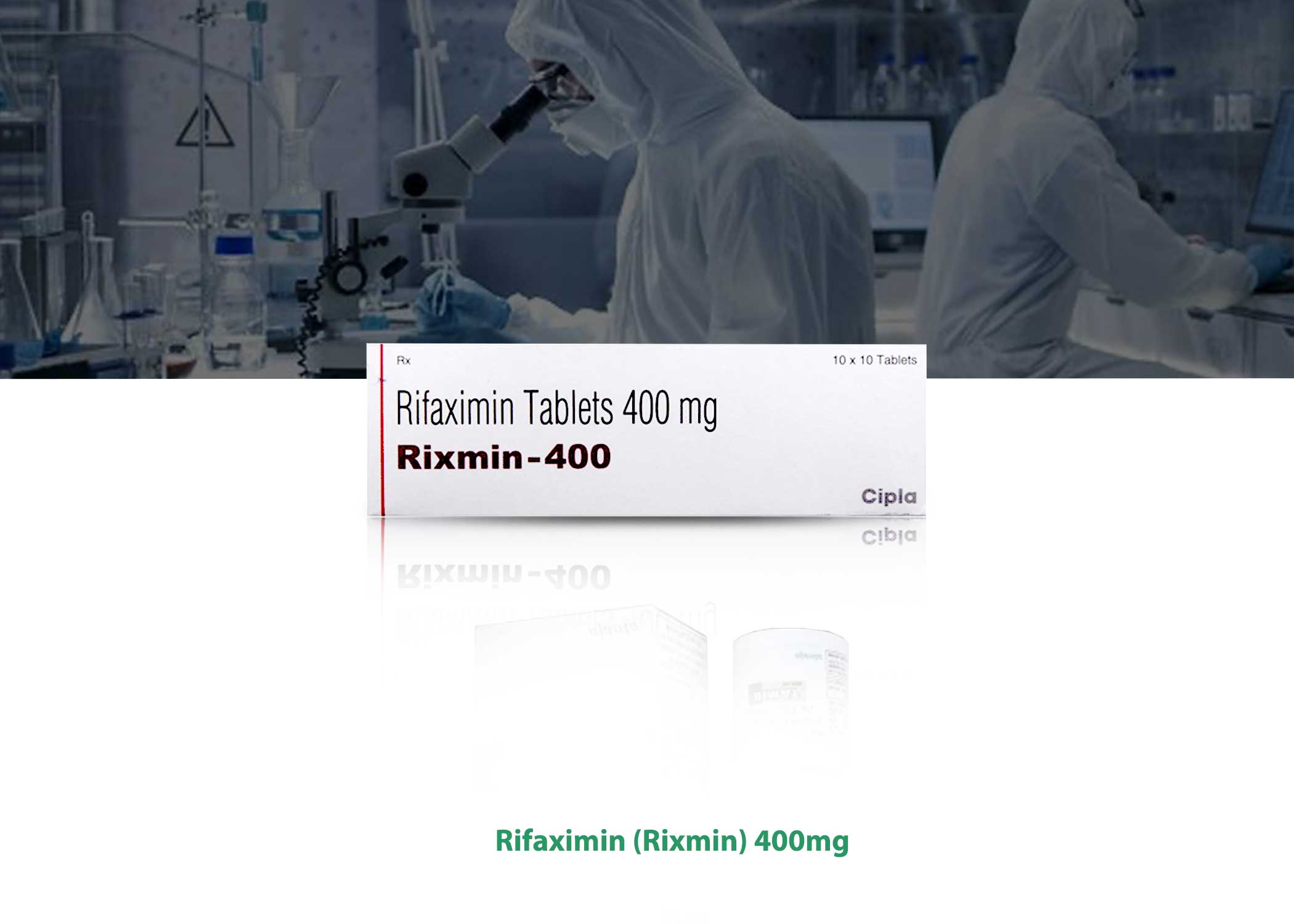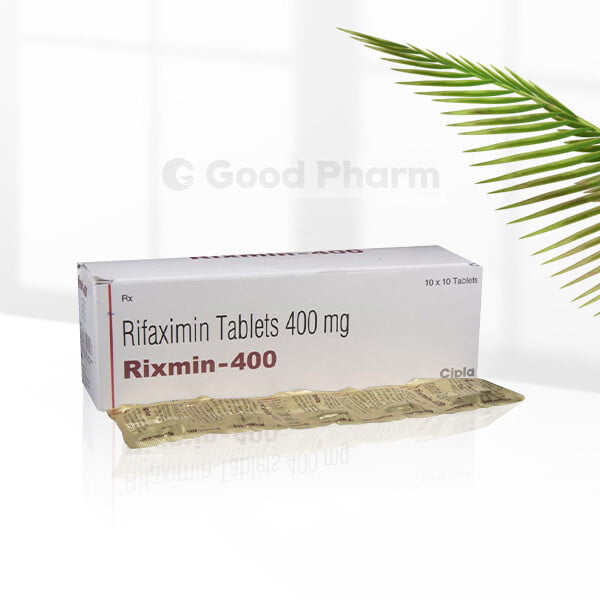- Your cart is empty
- Continue Shopping
Rifaximin (Rixmin) 400mg tablet and its active ingredient, rifaximin, is a broad spectrum, prescription oral antibiotic. This medicine is used primarily for gastrointestinal and liver diseases because it is specific to the gastroenterology tract due to its non-absorbable profile.

What does Rifaximin (Rixmin) 400mg contain?
Rixmin 400mg contains Rifaximin, which is a medication that belongs to the antibiotic drug class.
In the US, Rixmin tablet, with its active ingredient, Rifaximin is FDA-approved for the treatment of the following conditions:
- Irritable bowel syndrome with diarrhea in adults
- Overt hepatic encephalopathy in adults
- Traveler’s diarrhea in adults and pediatric patients 12 years of age and older
The non-FDA-approved (off-label) indications include:
- Small intestinal bacterial overgrowth (SIBO)
- Diverticulitis
- Inflammatory bowel disease
- Spontaneous bacterial peritonitis
- Clostridium difficile infection
Rifaximin has also demonstrated an effect on enteric protozoa activity in HIV patients with Cryptosporidium parvum and Blastocystitis hominis intestinal infections.
This antibiotic is not used for the treatment of colds, flu, or other viral infections. Using antibiotics when they are not needed increases your risk of getting an infection and can lead to its decreased effectiveness.
How does Rifaximin (Rixmin) 400mg work?
Rixmin 400 mg tablet and its active ingredient, Rifaximin, is a broad spectrum bactericidal oral antibiotic which has activity against enteric pathogens including gram-positive and gram-negative aerobic and anaerobic bacteria.
Rifaximin is non-absorbable, it reaches high concentrations within the gastrointestinal lumen, allowing it to work effectively on various gastrointestinal diseases without systemic effects. It has a very low incidence of bacterial mutation and drug resistance to Rifaximin in extra-intestinal bacteria. However, long-term use of Rifaximin can result in resistant bacterial mutants in the enteric system.
Who cannot use Rifaximin (Rixmin) 400mg?
Due to excellent safety profile of Rifaximin, there are very few contraindications:
- Patients with hypersensitivity to the rifaximin, rifamycins, or excipients should avoid this medication as hypersensitivity reactions like exfoliative dermatitis, angioneuretic edema and prophylaxis have been reported.
- Concomitant administration of P-glycoprotein inhibitors such as cyclosporine with rifaximin can substantially augment the systemic exposure to rifaximin and can lead to toxicity.
- Rifaximin is contraindicated to patients with severe hepatic impairment: There is increased systemic exposure to rifaximin in patients with severe hepatic impairment. Therefore, caution should be exercised when administering rifaximin in patients with severe hepatic impairment.
How should Rifaximin (Rixmin) 400mg be taken?
Take Rixmin 400mg tablet exactly as prescribed by your doctor. You may view Additional Information tab for recommended doses. Take this medication orally with food (to reduce gastrointestinal upset) or without food. Swallow it as a whole. Do not chew, crush or break it. It should be taken regularly at evenly spaced time intervals. Follow all directions on your prescription label. Do not take this medicine in larger or smaller amounts or for longer than recommended. Do not skip any doses and finish the full course of treatment even if you feel better. Stopping the medicine too early may lead to the return or worsening of the infection.
The dose regimen and the length of treatment may vary depending on the type of infection and disease severity.
What if you miss a dose?
Skipping doses or not completing the course of treatment may increase the risk of re-infection that would be difficult to treat in the future. If you miss a dose of this medicine, take it as soon as possible. However, if it is almost time for your next dose, skip the missed dose and go back to your regular dosing schedule. Do not double the doses.
What if you take too much?
Taking 1 or 2 extra doses is unlikely to harm you. However, if you feel unwell, seek consult with your healthcare provider.
What are the side effects of Rifaximin (Rixmin) 400mg?
Most side effects do not require any medical attention and disappear as your body adjusts to the medicine. Consult your doctor if they persist or if you’re worried about them.
The most common side effects of Rixmin include:
- Nausea
- Gastrointestinal upset
- Fatigue
- Peripheral edema
- Dizziness
- Muscle spasms
- Fungal or bacterial superinfection – rare but the most common adverse effect for long-term use of rifaximin
Get emergency medical help if you have signs of an allergic reaction (hives, difficulty of breathing, swelling in your face of throat) to rifaximin, or a severe skin reaction (fever, sore throat, burning in your eyes, skin pain, red or purple skin rash that spreads and causes blistering and peeling).
What other precautions should be taken?
Children
This drug is not recommended for children below 12 years old.
Elderly
It is safe to use in this age population.
Pregnancy
Rixmin and its active ingredient, rifaximin, is categorized as FDA pregnancy class C. There are no adequate and well controlled studies in pregnant women. Rifaximin has been shown to be teratogenic in rats and rabbits at doses that caused maternal toxicity. Rifaximin tablets should be used during pregnancy only if the potential benefit justifies the potential risk to the fetus. Additional contraceptive precautions recommended and local protocol should be consulted.
Breastfeeding
It is not known whether rifaximin is excreted in human milk. Because many drugs are excreted in human milk and because of the potential for adverse reactions in nursing infants from rifaximin, a decision should be made whether to discontinue nursing or to discontinue the drug, taking into account the importance of the drug to the mother.
Drug-Disease Interactions
Caution is advised for patients who have a systemic bacterial infection.
Drug-Drug Interactions
Riximin interacts with a lot of drugs but it has no known severe interactions with other drugs. It may change how your medications work or increase your risk of serious side effects.
The only serious interactions of rifaximin include: BGC intravesical live and cholera vaccines.
Rifaximin has moderate interactions with at least 59 different drugs such as: Acebutolol, Afatinib, Amiodarone, Cyclosporine, Gemfibrozil etc.
This document does not contain all possible drug interactions. Keep a list of all the products you use (including prescription/nonprescription drugs and herbal products) and share it with your doctor. Do not start, stop, or change the dosage of any medicines without your doctor’s approval.
Alcohol
It is not advised to take alcohol with this drug.
Driving
This drug does not affect your ability to drive.
Diet and lifestyle
You can eat and drink normally while taking this drug.
How should you store Rifaximin (Rixmin) 400mg?
- Store the medicine at room temperature, away from heat, moisture, and direct light.
- Keep out of the reach of children and pets.
- Do not keep expired medicine or medicine no longer needed.
- Ask your healthcare professional how you should dispose of any medicine you do not use.
Quick Tips
- Do not skip any dose and finish the full course of treatment even if you feel better. Stopping it too early may make the infection come back and make it harder to treat.
- Stop taking it and inform your doctor immediately if you have severe diarrhea or if you develop itchy rash, swelling of the face, lips, or tongue, and difficulties breathing.
What company produces Rifaximin (Rixmin) 400mg?
| Cipla | CEO: Umang Vohra Founder: Kwaja Abdul Hamied Founded: 1935 Headquarters: Mumbai, Maharashtra, Gangtok, Sikkim Number of employees: 22,036 Subsidiaries: Jay Precision Pharmaceuticals Private Limited Website: www.cipla.com |
Additional Information
| Dosage | The dose of this medicine may be different for different patients. Follow your doctor's orders or the directions on the label. Recommended doses are as follows. If your dose is different, do not change it unless your doctor tells you to do so. For Irritable bowel syndrome with Diarrhea – the suggested dose of rifaximin is 400mg three times a week or 550mg twice daily for two weeks. Retreat up to two times if symptoms recur. For Traveler’s Diarrhea – the typical dose is 200mg three times daily for three days. For Traveler’s Diarrhea prevention/prophylaxis – the recommended dose is 200mg twice daily or 600mg daily. For Hepatic encephalopathy – the required dose is 550mg twice or three times daily, usually continued for an extended period to prevent its recurrence. Rifaximin is generally used in combination with Lactulose to treat Hepatic encephalopathy. For Small intestinal bacterial overgrowth (SIBO) – the typical dose is 400mg three times daily for two weeks. For Diverticular disease treatment and prevention – the suggested dose is 400mg twice daily for seven days For recurrent Clostridium difficile – the typical dose is 400mg twice daily for two weeks. For Spontaneous bacterial peritonitis prophylaxis – the recommended dose is 400mg three times daily indefinitely. |
|---|---|
| Side Effects | -Nausea |
| Contraindications | -Allergy to the rifaximin, rifamycins, or excipients |
| Pack Size | 30 Pills, 60 Pills, 90 Pills |
Only logged in customers who have purchased this product may leave a review.









Reviews
There are no reviews yet.